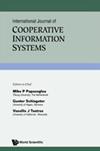Classification of Community Complaints Against Public Services on Twitter
IF 0.5
4区 计算机科学
Q4 COMPUTER SCIENCE, INFORMATION SYSTEMS
International Journal of Cooperative Information Systems
Pub Date : 2020-05-18
DOI:10.29040/IJCIS.V1I1.6
引用次数: 21
Abstract
The Surakarta Al-Islam Vocational School is a private educational institution that requires all students to pay school tuition fees. Education is an obligation for all Indonesian citizens. The cost of education is one of the most important input components in implementing education. Because cost is the main requirement in achieving educational goals. SPP School is a routine school fee that is carried out every month. Based on last year's School Admin report, many students were late in paying school tuition fees, around 60%. This is a very big problem because the income of school funds comes from school tuition. The purpose of this research is that the researcher will build a prediction system using the best classification method, which is to compare the accuracy level of the Naïve Bayes method with the K-K-Nearest Neighbor method. Because both methods can make class classifications right or late, in paying school fees. processing using dapodic data for 2017/2018 as many as 236 data. In improving accuracy, the researcher also applies feature selection with Information Gain, which is useful for selecting optimal parameters. System testing is carried out using the Confusion Matrix method. The final results of this study indicate that the Naïve Bayes Method + Information Gain Method produces the highest accuracy, namely 95% compared to the Naïve Bayes method alone, namely 85% and the K-NN method, namely 81%. Keywords— Big Data, Twitter, Naïve Bayes, Classification, Complaint.Twitter上社区对公共服务的投诉分类
苏拉卡塔伊斯兰职业学校是一所私立教育机构,要求所有学生支付学费。教育是所有印尼公民的义务。教育成本是实施教育的最重要的投入组成部分之一。因为成本是实现教育目标的主要要求。SPP学校是每月进行的常规学费。根据去年的学校管理报告,许多学生拖欠了学费,约占60%。这是一个很大的问题,因为学校资金的收入来自学校学费。本研究的目的是,研究人员将使用最佳分类方法建立一个预测系统,即比较Naïve Bayes方法和K-K最近邻方法的准确度水平。因为在支付学费时,这两种方法都可以使班级分类正确或延迟。使用2017/2018年多达236个数据的dapodic数据进行处理。在提高精度方面,研究人员还应用了具有信息增益的特征选择,这对于选择最佳参数很有用。使用混淆矩阵方法进行系统测试。本研究的最终结果表明,与单独的朴素贝叶斯方法(即85%)和K-NN方法(即81%)相比,朴素贝叶斯方法+信息增益方法产生的准确率最高,即95%。关键词——大数据,推特,朴素贝叶斯,分类,投诉。
本文章由计算机程序翻译,如有差异,请以英文原文为准。
求助全文
约1分钟内获得全文
求助全文
来源期刊

International Journal of Cooperative Information Systems
工程技术-计算机:信息系统
CiteScore
2.30
自引率
0.00%
发文量
8
审稿时长
>12 weeks
期刊介绍:
The paradigm for the next generation of information systems (ISs) will involve large numbers of ISs distributed over large, complex computer/communication networks. Such ISs will manage or have access to large amounts of information and computing services and will interoperate as required. These support individual or collaborative human work. Communication among component systems will be done using protocols that range from conventional ones to those based on distributed AI. We call such next generation ISs Cooperative Information Systems (CIS).
The International Journal of Cooperative Information Systems (IJCIS) addresses the intricacies of cooperative work in the framework of distributed interoperable information systems. It provides a forum for the presentation and dissemination of research covering all aspects of CIS design, requirements, functionality, implementation, deployment, and evolution.
 求助内容:
求助内容: 应助结果提醒方式:
应助结果提醒方式:


